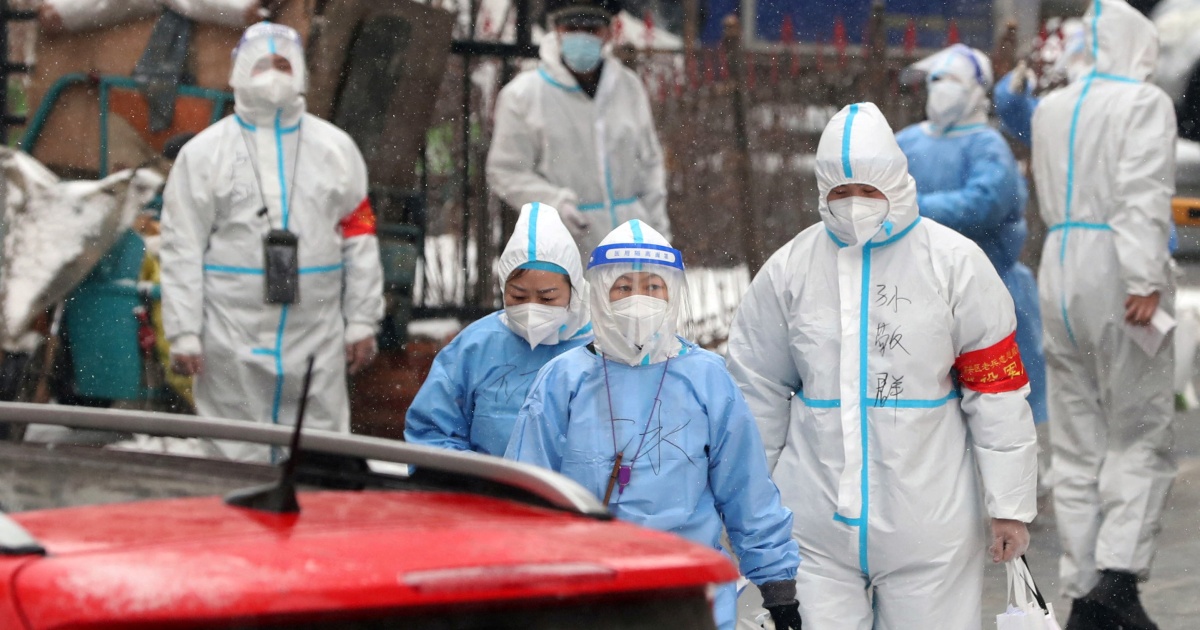Lockdown in Shanghai: delayed treatment and increasing COVID-19 numbers
Beijing, China:
After failing to isolate COVID, Beijing officials intervened in Shanghai, closing the city down in phases, and insisting that the country sticks to its zero-tolerance policy to save its medical system from collapsing. The megacity is struggling to suppress the Omicron, as well as rising public dissatisfaction with quarantine policies. People with long-term conditions or who require extensive care are going without treatment as a result of the government’s stringent stance on regulating the coronavirus.
Recently, a popular article on Chinese social media documented the death of a lady at a Shanghai rehabilitation centre. The patient named Li Chang is a Tsinghua University alumnus and mother of two who required 24-hour care after suffering a brain haemorrhage last year. Her care staff was compelled to quarantine in late March, as per social media posts, after several people at the institution tested positive for COVID-19. Her friends and family were forbidden from responding to her needs, and she died just a few days later. In a now-deleted piece on her WeChat site, Xu Liyuan, a writer and former journalist, lamented Li Chang’s death. Xu subsequently stated that she removed the post because Li’s family requested not to publish about their relative’s death.
Weibo is again swamped with posts asking for assistance for those suffering from chronic illnesses including kidney disease, TB, and cancer, as it was during past lockdowns. An article about cancer sufferers in Shanghai was also published on Dxy.cn, an online medical information site that gained a lot of traction. COVID-19 is one of the hundreds of fatal illnesses that exist in the world. People across the social media network are pleading with the administration to enable all patients to get the same critically needed, medical care.
There are hundreds of thousands of cases in Shanghai, Shenzhen, and Jilin, according to a deleted Zhihu article that criticized the zero-COVID policy while mocking ultranationalists who support severe quarantine restrictions. Several individuals have died because of the virus, counting both symptomatic and asymptomatic instances. As per the post “Lockdown Enthusiasts” are so fond of using the preservation of people’s lives to defend the policy, the post even taunted and questioned these people for a definite number of persons who died during the latest wave.
Despite outraged social media posts, Chinese news channels have remained mute on tales regarding medical care shortages or medical system failures throughout the lockdown. A Shanghai East Hospital nurse died of an asthma attack three weeks ago after being refused treatment at her own hospital. Thousands of outraged comments flooded the internet in response to the report. Caixin, one of the few Chinese news sites to cover the event, had its piece removed after it was published. A story alleging terrible working conditions for substitute orderlies at Shanghai’s Donghai Elderly Care Hospital was also published by Sixth Tone but then subsequently removed.
Because detailed documentation is scarce, comparable occurrences are frequently shared online via pictures and videos, the veracity of which is impossible to verify. Another now-deleted WeChat blog post claimed that a doctor in Heilongjiang Province committed suicide after being penalized for doing surgery on a patient who was COVID-19 positive without his knowledge.
A recent WeChat article by the Signal News, which was shortly suppressed, appears to give additional information on Dr Shi Jun’s situation. The author claims that the patient in question used her nucleic acid test results, which were negative at the time; that Dr Shi was a well-respected surgeon who was vital to his hospital’s neurosurgery department; and that news of his suicide has been heavily censored on the Chinese social media and the internet.
Given the stress of the lengthy lockdown and acute shortages of food, drugs, and medical services, it’s unsurprising that emotions are running high. Two additional stories about Shanghai lockdowns have stirred outrage, each for different reasons.
The first is a social media post from Shanghai’s Sixth People’s Hospital about a male expatriate who underwent a successful operation at the hospital after suffering from an erection that lasted more than fifty hours. Angry internet users wondered why a privileged foreigner would be given such preferential care considering the limited medical resources available. The controversy over the medically legitimate operation took place on March 2nd before the worst of the Omicron crisis hit the country. The hospital’s message after the surgery also appears to be part of a typical social media promotion of the work of its different medical divisions, of which the urology unit is just one.
The second example is about the massive public outcry over images and video of a pet corgi being beaten to death by a white-suited pandemic worker on a Shanghai street after its owner was brought into quarantine. There were two pieces written, which are available on the subject.
In the first, “A Corgi Was Killed on the Streets of Shanghai,” the author recalls his childhood in the country, where he describes the loving companionship of pet dogs and compares it with the merciless treatment of China’s urban pets during pandemic lockdowns nowadays. An apt quotation from Lu Xun appears in the essay”When the brave are angry, they turn their swords on the stronger; when the cowardly are angry, they turn their swords on the weaker.”
The second piece, “The Casual Murdering of a Corgi,” argues that killing pets during a pandemic is cruel, useless, and perhaps unlawful. The author also compares the treatment of cats and dogs in Shanghai with the care of animals in war-torn Ukraine, praising the compassion with which Ukrainian people, refugees, and the military treat their pets. The essay concludes with “In 2022, we cannot rely on laws, policies, or the kindness of others to protect our pets. We can only rely on ourselves.”













